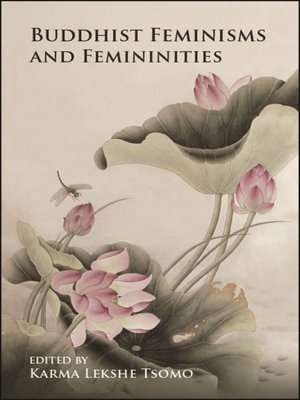
Sign up to save your library
With an OverDrive account, you can save your favorite libraries for at-a-glance information about availability. Find out more about OverDrive accounts.
Find this title in Libby, the library reading app by OverDrive.



Search for a digital library with this title
Title found at these libraries:
| Loading... |
Silver Medalist, 2020 Independent Publisher Book Awards in the Religion (Eastern/Western) Category
This groundbreaking book explores Buddhist thought and culture, from multiple Buddhist perspectives, as sources for feminist reflection and social action. Too often, when writers apply terms such as "woman," "femininity," and "feminism" to Buddhist texts and contexts, they begin with models of feminist thinking that foreground questions and concerns arising from Western experience. This oversight has led to many facile assumptions, denials, and oversimplifications that ignore women's diverse social and historical contexts. But now, with the tools of feminist analysis that have developed in recent decades, constructs of the feminine in Buddhist texts, imagery, and philosophy can be examined—with the acknowledgment that there are limitations to applying these theoretical paradigms to other cultures. Contributors to this volume offer a feminist analysis, which integrates gender theory and Buddhist perspectives, to Buddhist texts and women's narratives from Asia. How do Buddhist concepts of self and no-self intersect with concepts of gender identity, especially for women? How are the female body, sexuality, and femininity constructed (and contested) in diverse Buddhist contexts? How might power and gender identity be perceived differently through a Buddhist lens? By exploring feminist approaches and representations of "the feminine," including persistent questions about women's identities as householders and renunciants, this book helps us to understand how Buddhist influences on attitudes toward women, and how feminist thinking from other parts of the world, can inform and enlarge contemporary discussions of feminism.
This groundbreaking book explores Buddhist thought and culture, from multiple Buddhist perspectives, as sources for feminist reflection and social action. Too often, when writers apply terms such as "woman," "femininity," and "feminism" to Buddhist texts and contexts, they begin with models of feminist thinking that foreground questions and concerns arising from Western experience. This oversight has led to many facile assumptions, denials, and oversimplifications that ignore women's diverse social and historical contexts. But now, with the tools of feminist analysis that have developed in recent decades, constructs of the feminine in Buddhist texts, imagery, and philosophy can be examined—with the acknowledgment that there are limitations to applying these theoretical paradigms to other cultures. Contributors to this volume offer a feminist analysis, which integrates gender theory and Buddhist perspectives, to Buddhist texts and women's narratives from Asia. How do Buddhist concepts of self and no-self intersect with concepts of gender identity, especially for women? How are the female body, sexuality, and femininity constructed (and contested) in diverse Buddhist contexts? How might power and gender identity be perceived differently through a Buddhist lens? By exploring feminist approaches and representations of "the feminine," including persistent questions about women's identities as householders and renunciants, this book helps us to understand how Buddhist influences on attitudes toward women, and how feminist thinking from other parts of the world, can inform and enlarge contemporary discussions of feminism.






